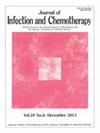Assessing the adequacy of blood culture collection in patients aged 80 years or older
IF 1.9
4区 医学
Q3 INFECTIOUS DISEASES
引用次数: 0
Abstract
Introduction
Bloodstream infections (BSIs) are common and fatal conditions in hospitalized patients. Despite higher BSI mortality rates in older adult patients, predicting BSIs in this population remains challenging. This study aimed to assess whether blood culture (BC) collection is adequate for these patients.
Materials and methods
We conducted a retrospective study of BCs collected from hospitalized patients between June 2020 and March 2024 at a tertiary care hospital in Japan.
Results
A total of 11,674 BC sets were collected from 5837 hospitalized patients. The true-positive rate was significantly higher in patients aged ≥80 years than in those aged <80 years (13.6 % vs. 10.6 %, p < 0.001). Additionally, the contamination rate was higher in patients aged ≥80 years than in those aged <80 years (3.1 % vs. 2.2 %, p = 0.016). However, chills were less frequent in patients aged ≥80 years. Additionally, the median temperature was lower in older adult patients than in those aged <80 years.
Conclusions
BCs may be insufficiently collected in patients aged ≥80 years. Furthermore, a bundled intervention approach is needed for proper BC collection among patients aged ≥80 years.
评估 80 岁及以上患者血液培养采集的充分性
血流感染(bsi)是住院患者常见且致命的疾病。尽管老年患者的BSI死亡率较高,但预测这一人群的BSI仍然具有挑战性。本研究旨在评估血培养(BC)采集对这些患者是否足够。材料和方法我们对日本一家三级医院2020年6月至2024年3月住院患者收集的bc进行了回顾性研究。结果5837例住院患者共采集BC 11674套。≥80岁患者的真阳性率明显高于≥80岁患者(13.6% vs. 10.6%, p <;0.001)。此外,≥80岁患者的污染率高于≥80岁患者(3.1% vs. 2.2%, p = 0.016)。然而,在年龄≥80岁的患者中,寒战较少发生。此外,老年患者的中位体温低于80岁患者。结论在≥80岁的患者中,sbc可能收集不足。此外,在年龄≥80岁的患者中,需要采用捆绑干预方法进行适当的BC采集。
本文章由计算机程序翻译,如有差异,请以英文原文为准。
求助全文
约1分钟内获得全文
求助全文
来源期刊

Journal of Infection and Chemotherapy
INFECTIOUS DISEASES-PHARMACOLOGY & PHARMACY
CiteScore
4.10
自引率
4.50%
发文量
303
审稿时长
47 days
期刊介绍:
The Journal of Infection and Chemotherapy (JIC) — official journal of the Japanese Society of Chemotherapy and The Japanese Association for Infectious Diseases — welcomes original papers, laboratory or clinical, as well as case reports, notes, committee reports, surveillance and guidelines from all parts of the world on all aspects of chemotherapy, covering the pathogenesis, diagnosis, treatment, and control of infection, including treatment with anticancer drugs. Experimental studies on animal models and pharmacokinetics, and reports on epidemiology and clinical trials are particularly welcome.
 求助内容:
求助内容: 应助结果提醒方式:
应助结果提醒方式:


